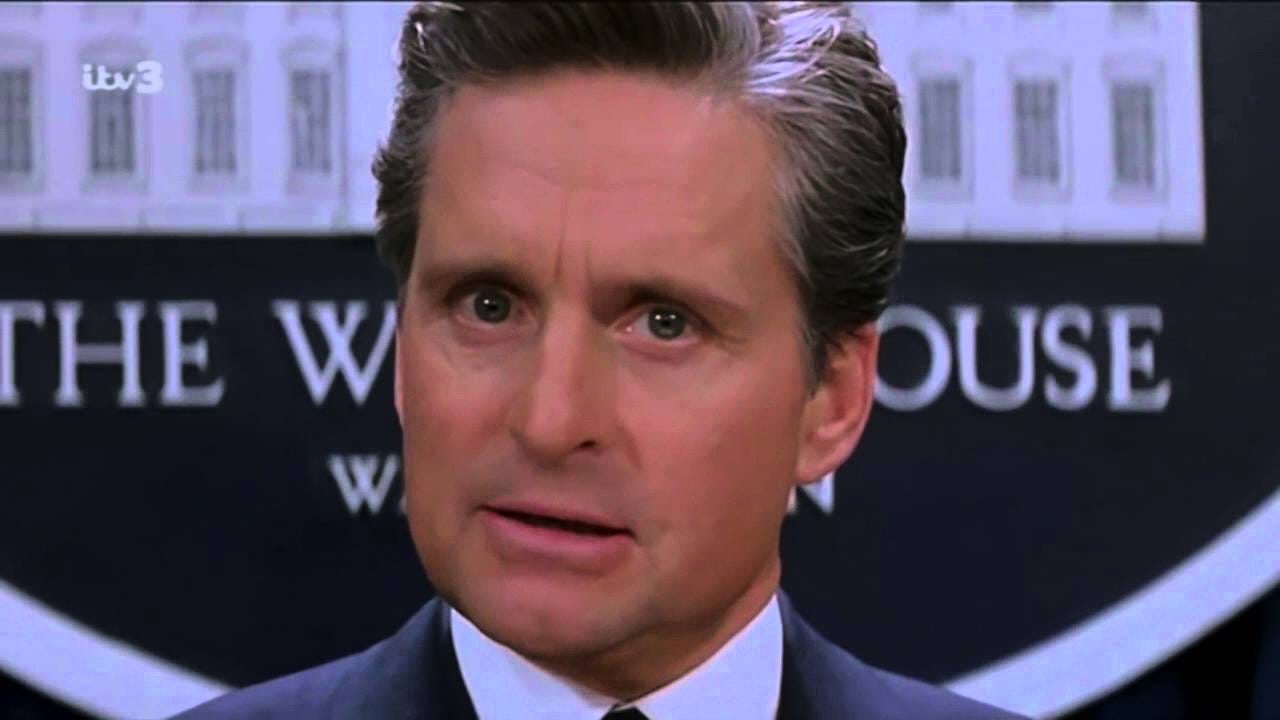Andrew Shepherd’s Legacy
Andrew Shepherd may not be a real president, but his presidential legacy is very real.
Jack Hughes, our correspondent from on high, our Canadian sensation, our pop culture vulture, is back with a reassessment of the real-world legacy of a fictional president, Andrew Shepherd. Hughes last month uncovered Dan Quayle as the Keyser Söze of Mike Pence’s world.

by Jack Hughes
The American President came out twenty-five years ago. The president in question, Andrew Shepherd, was a new breed of post-Cold War, postmodern POTUS. He wasn't defending the United States from communists or terrorists; aliens or asteroids; but from fossil fuels and assault rifles.
In fact, the only time Commander-in-Chief Shepherd authorized the use of military force – a ‘proportional response’ retaliatory strike against Libyan intelligence – it was framed as a teachable moment, as he solemnly explained, “you have just seen me do the least presidential thing I do.”
The American President was literally a modern-day Frank Capra movie – Capra’s grandson Frank Capra III was the first assistant director. Shepherd was an idealized version of a Baby Boomer president, who bore many of the same hallmarks as the then-serving President Bill Clinton.
The movie’s director Rob Reiner, toldThe New York Times in 1995, it was intended to be a ‘paean to the presidency’ – “We've had such distrust of our public leaders and officials in recent years,” Reiner explained, “this was a way of starting to restore public confidence in public officials.”
Andrew Shepherd may not be a real president, but his presidential legacy is very real. Many of the unused bits from Sorkin’s original 400-page screenplay were recycled to create his television drama The West Wing, which, in turn, influenced and inspired future leaders such as Barack Obama.
Andrew Shepherd may not be a real president, but his presidential legacy is very real.
He has even inspired Republicans. Back in 2016, Donald Trump threatened to attack Senator Ted Cruz’s wife. The Texan responded with a page out of the movie’s script: “If Donald wants to get into a character fight, he’s way better off sticking with me because Heidi is way out of his league.”
And, for that reason – with all due respect to Mr. Reiner – the movie’s mastermind was its scriptwriter Aaron Sorkin. Shepherd has a real-world presidential legacy because of Sorkin’s soaring rhetoric. His climactic press conference remains one the great speeches in all of cinematic history.
His erudite and eloquent lesson about America being “advanced citizenship” and his candid, even cynical, description of what it takes to win elections are as relevant and resonant today as they were in the mid-nineties. “My name is Andrew Shepherd, and I am the President!” still gives us shivers.
Yet, historians caution that it’s difficult to accurately assess presidential legacies because presidents are people and people aren’t perfect. Even some of the highest ranked real presidents – Thomas Jefferson, Woodrow Wilson, John Kennedy – did or believed things that cast shadows.
Shepherd is no different. For a character intended to restore trust in public officials, it’s rather striking that the main plot of the movie is about how he placed himself in a conflict of interest by introducing a resolution advocated by the woman he loves and the lobby group she’s worked for.
Re-watching the movie today – with older, jaded, and jaundiced eyes – it’s shocking to see Shepherd and his senior staff openly dismiss an obvious conflict. The sole exception is Michael J. Fox's character, Lewis, who serves as the personification of Shepherd’s conscience in the movie.
Andrew Shepherd: “It’s important legislation that for the first time has a legitimate chance. I think she deserves every possible opportunity to…”
Lewis Rothschild: “She? You mean ‘it’, didn’t you, sir? You meant the important legislation deserves every opportunity.”
This complicates Shepherd’s presidential legacy. We think of the movie as having a positive, happy ending because Shepherd and Sydney Ellen Wade reconcile; he gets her roses from the White House rose garden; and he receives a standing ovation as he enters to give the State of the Union.
And yet, appearances can be deceiving. Go back and watch the archived footage of Richard Nixon’s last State of the Union speech in January 1974. Nixon enters the House Chamber at the height of Watergate, months before he resigns the presidency, to a seemingly genuine standing ovation.
According to Sorkin himself, when the final credits roll President Shepherd is “in deep political trouble.” Based on the number of congressional hearings there were on The West Wing, one has to think that if The American President were even a half hour longer we would’ve seen subpoenas.
Our view of Shepherd would likely be different had the movie not ended with roses and applause but censure or impeachment. He’d seem less like an ideal president and more like a real president.
Our view of Shepherd would surely be different had the movie not ended with roses and applause but censure or impeachment. He’d seem less like an ideal president and more like a real president. And if you think back twenty-five years, there’s an almost prophetic parallel that can be drawn.
The movieis set in the third year of Shepherd’s first term and it came out during Bill Clinton’s third year in office. In Reiner’s Times interview he said it had “partly” to do with Clinton “who I happen to think is getting a lot of bad raps because he’s on the tail end of the media feeding frenzy.”
Unbeknownst to Reiner (or anyone), Clinton and Monica Lewinsky began their secret relationship the same week The American President opened in theaters. On November 15, 1995, Clinton and Lewinsky had their first encounter. Two days later this movie came out in which a president begins a secret and ultimately controversial relationship.
To be clear, the nature of the two relationships are very, very different. The timelines are what’s the same – triply so when you realize the film’s storyline also begins in November the year before a presidential election – which blurs, arguably even blows away, any line between fact and fiction.
If fantasy continued to mirror reality, Shepherd – like Clinton – would have been re-elected and impeached but not removed from office. Let’s assume that were the case, would Shepherd’s presidential legacy be tainted or tarnished? Perhaps, but there are still those who pine for the Clinton years.
It’s not hard to revisit, revise or refurbish a presidential legacy. Aaron Sorkin laid it all out: “You gather a group of middle-aged, middle-class, middle-income voters who remember with longing a simpler time, and you talk to them about family, American values, and personal character.”

What do you think of today's email? I'd love to hear your thoughts, questions and feedback. I might even put ‘em in the newsletter if I don’t steal it outright.
Enjoying this newsletter? Forward to a friend! They can sign up here. Unless of course you were forwarded this email, in which case you should…
Want a way to send gifts and support local restaurants? Goldbelly’s got you hooked up.
I used this to order scotch delivered right to my door. Recommend.
I’ve lost 35 pounds this year with Noom, and haven’t had to cut out any foods. Noom is an app that uses psychology, calorie counting, and measuring activity to change your behavior and the way you think about food. I’m stronger and healthier than I’ve been in years. Click on the blue box to get 20% off.
If this newsletter is of some value to you, consider donating. Honestly, I’m not doing this for the money. I’m writing this newsletter for myself, and for you. And a lot of you are contributing with letters and by suggesting articles for me to post. But some of you have asked for a way to donate money, so I’m posting my Venmo and PayPal information here. I promise to waste every cent you give me on having fun, because writing this newsletter for you is some of the most fun I’ve had. Venmo me at @Jason-Stanford-1, or use this PayPal link.


